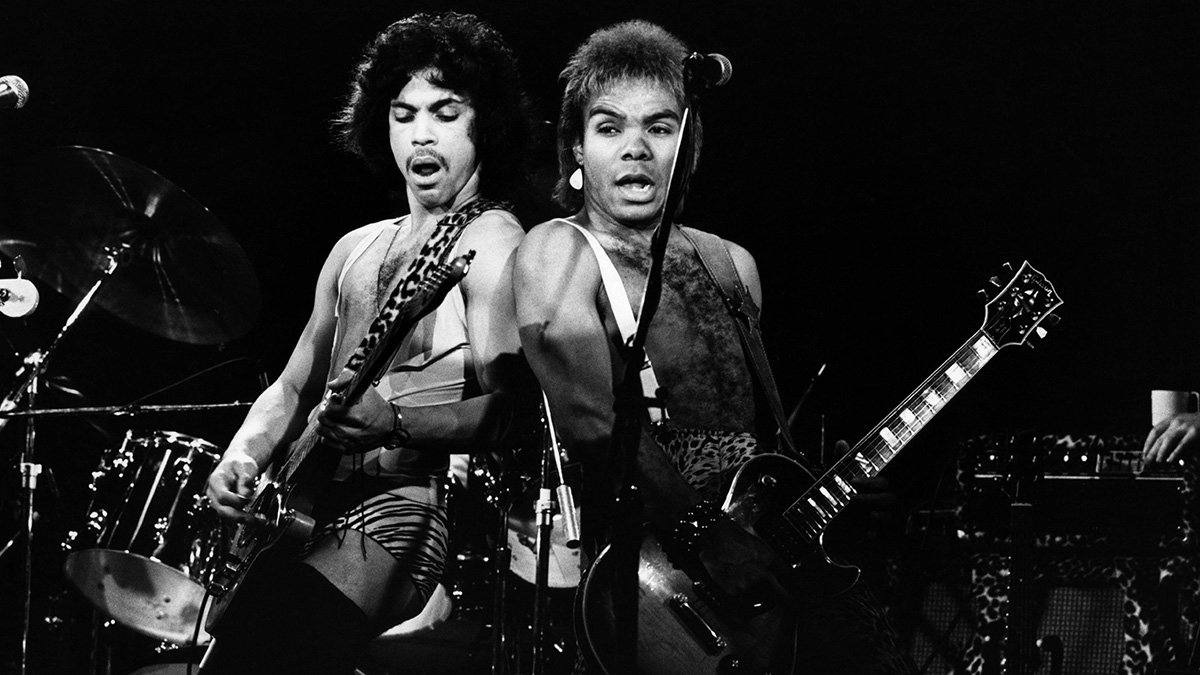“Jesus, that was hard! But I got it. I welcome the challenges”: Guitar hero Steve Vai reveals the difficulties of playing King Crimson music - and how he gets by with a little help from Robert Fripp
“I’m a fan and want to play the exact notes,” Vai says

For all the progressive rock aficionados out there, the ongoing BEAT tour has been a source of unimaginable excitement.
It features two former members of King Crimson - guitarist Adrian Belew and bassist Tony Levin - performing Crimson music from the ’80s with two other legendary musicians, drummer Danny Carey from Tool, and guitar hero Steve Vai.
The first run of BEAT dates took place last year and you can bet there’s more to come.
And as Steve Vai tells MusicRadar, he’s relishing the challenge of playing this unconventional music with such gifted musicians.
First, Steve describes the experience of playing alongside Danny Carey.
“I’ve been aware of Tool since the early 90s,” he says. “I didn’t personally know anybody in the band but I’d seen them play.
“When the BEAT thing happened, I met Danny for the first time at a Tool show. We hung out backstage and I have to say he is an absolute sweetheart. But to play with him, oh my god!
Get the MusicRadar Newsletter
Want all the hottest music and gear news, reviews, deals, features and more, direct to your inbox? Sign up here.
“He can do all the difficult stuff but with this incredible feel. He knows how to move. We don’t play to a click, everything is very fluid, it has to be with this kind of music.
“Danny does this solo every night on Indiscipline and it’s always remarkable. He never repeats himself.
“You can tell when a musician is connected and really in the moment of what they’re doing. Things will come out that feel magical and unexpected. That’s what Danny does every night. It’s a miracle!
“Adrian and I would be watching and then look at each other as if to say ‘How?!’ He’s an astonishing musician.”
Steve then talks about performing with Adrian Belew, another legendary guitarist who has, like Vai, a connection to Frank Zappa.
“I can’t say enough about Adrian. I knew about his work with Zappa, but that didn’t show me all of his brilliance.
“You need to hear him flexing his muscles in different situations to discover the breadth of the man’s abilities. There are his contributions to David Bowie and Talking Heads, but what he did on those ’80s King Crimson records was monumental.
“Together we’ve merged our sounds in a way that creates a really dynamic show.
“I would say Adrian is underrated in the echelons of guitar. Nobody plays like anybody else, nobody can play like me, but they can get sort of close. Honestly, there’s no-one close to Adrian.
“There’s a special way he’s crafted his own dimension of sounds. To see him play this complex polymetric music while singing at 75 is unbelievable. He still hits the notes with that silky voice. He’ll talk and joke around while I have to keep my head down. The man is a marvel!”
Steve uses a Roland synth rig for BEAT shows. It could be his most avant-garde rig yet…
“I’ve played around with synths before but I’ve never had to include them as part of the war chest,” he says.
“I’ve used Roland gear on various records. There’s a song I wrote called Upanishads where I used almost every setting for something unusual. But with BEAT I had to go back and listen to how the synths were being used, because Robert [Fripp] and Adrian were the first to do that.
“They had the GR-300, which was odd and clunky, but it worked great for the music. Adrian brought his back. Synth gear has evolved since then, so I’m using the SY-1000 and GM-800.
"On Sartori In Tangier, most of the effects are coming from the Synth block in my Axe-Fx. It’s quirky because the notes jump around, you have to be delicate. For Industry, I built the fattest patch to do this huge cloud solo.
“I set out to honour the parts, because I’m a fan and want to play the exact notes. Robert and I are different beasts. Most of it was fine, I could hit the notes, which is great because that’s my job. If you come to see Steve Vai in BEAT, you get to see Steve Vai working! You come to my solo shows, it’s another thing entirely.
“Robert wrote beautiful parts, but the techniques didn’t come naturally [to me]. It’s different to what I do.
“There was a time in Zappa’s band when I was a heavy picker. That stuff was hard because Frank didn’t write on guitar, he would write on piano and then give it to you. His parts were so un-guitaristic! I had the chops and focus back then. Some of this Beat stuff took months to get under my fingers.
“There were things I had to reorganise a little. There’s a part in Waiting Man with this impossible picking thing that Robert does in fourths at quick speed. I had to drop a whole step with my Whammy pedal and work out a hammering riff using open strings.
"Then there’s Thela Hun Ginjeet, which has this obtuse picking part. The way I was doing it didn’t have that funky swagger. In the end I decided to strum it, which wasn’t conventional.
“And then there’s Three Of A Perfect Pair. Jesus, that was hard! But I got it.

"At my age, after everything I’ve done, I welcome the challenges," he says. "But when it came to Frame By Frame, it was relentless. There’s a cross-picking riff, it’s quite simple but it just never lets up. I could kinda do it, but it didn’t feel consistent.”
As it turns out, Robert Fripp had some words of wisdom to offer and helped point Steve in the right direction, encouraging him to put his own stamp on the twitchy 1981 masterpiece...
“I figured I could double pick it,” Steve says. “I didn’t have much choice. It was working but it didn’t fulfil me.
"It like I was cheating a bit. In the back of my mind, I was thinking, ‘Why not hammer this?’ I couldn’t get the part exactly right, it was awkward. And, god bless him, Robert has been helpful. He saw a video from our second show online, and sent over a suggestion.
“He said, ‘Why not hammer it all and then improvise away, before coming back for the chord changes?’ I was warming up backstage, saw his email and did it that night as suggested. It was easier and totally within my wheelhouse.
“The only other thing I changed was Elephant Talk. I chose to hammer a section because I liked how it rolled.”
Amit has been writing for titles like Total Guitar, MusicRadar and Guitar World for over a decade and counts Richie Kotzen, Guthrie Govan and Jeff Beck among his primary influences. He's interviewed everyone from Ozzy Osbourne and Lemmy to Slash and Jimmy Page, and once even traded solos with a member of Slayer on a track released internationally. As a session guitarist, he's played alongside members of Judas Priest and Uriah Heep in London ensemble Metalworks, as well as handling lead guitars for legends like Glen Matlock (Sex Pistols, The Faces) and Stu Hamm (Steve Vai, Joe Satriani, G3).
You must confirm your public display name before commenting
Please logout and then login again, you will then be prompted to enter your display name.
“They didn’t like Prince’s bikini underwear”: Prince’s support sets for the The Rolling Stones in 1981 are remembered as disastrous, but guitarist Dez Dickerson says that the the crowd reaction wasn’t as bad as people think
“We are so unencumbered and unbothered by these externally imposed rules or other people’s ideas for what music should be”: Blood Incantation on the making of Absolute Elsewhere and how “Data from Star Trek” saved the album – and the studio










